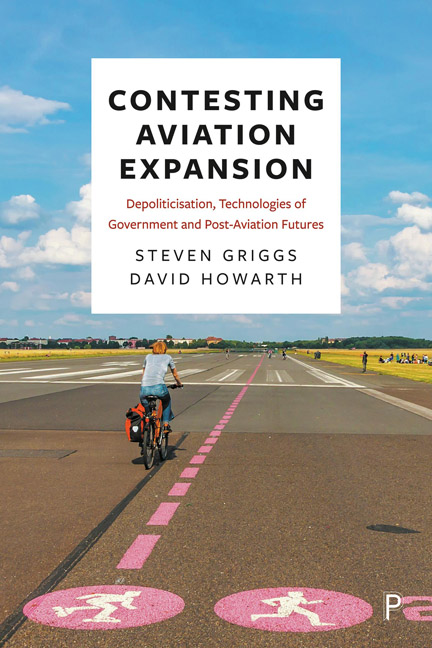 Contesting Aviation Expansion
Contesting Aviation Expansion Published online by Cambridge University Press: 18 January 2024
Our genealogies have demonstrated how the UK airports issue and the problem of aviation has evolved into a deepening policy controversy involving the clash of political forces, which espouse competing ideals and values. But they also show the difficulties in challenging the myths and fantasies built into the embedded narratives of sustainable aviation and the technologies of government, which seek to depoliticise and perpetuate aviation expansion, not to mention the highly organised resources of the industry and its supporters. This means that the questioning and problematisation of continued aviation expansion is ever more necessary if we are to meet the pressing demands of the global environmental crisis and the instabilities of living in the Anthropocene. Like Thomas Princen (2005), we thus ask the ‘what if?’ question. What if we were to disinvest from aviation and embark on an alternative agenda of post-growth policies? What would such an imaginary look like? What would such a transformation require? And how would we achieve it?
This chapter addresses these questions by putting forward a manifesto for the green transformation of aviation. We first identify and evaluate the two leading discourses that have emerged – ‘business as usual’ and ‘demand management’ – and which have come to frame public policy dialogue around aviation in the post-pandemic world. We argue that the expansionist logic of ‘business as usual’, which relies on the myth of technological fixes, efficiencies and offsetting, no longer provides the effective tools or policies to tackle the environmental injustices of aviation, if it ever did. But we also conclude that demand management, which offers an alternative to the discourse of continued growth, ultimately conforms to a logic of attenuation, supporting the politics of reform rather than transition and transformation. Reformist politics in our perspective leaves intact existing economic, political and social formations, simply installing one more updated version of the same operating system. Alone, it cannot fully accommodate the radical, non-linear and continual reorganisation of the politics of transition and transformation, which are necessary to bring about changes to our social identities, political institutions and practices of economic and social reproduction, as well as our underlying relations with nature, which can in turn bring about a post-growth, just and sustainable mode of aviation (Eckersley, 2021: 247– 9).
To save this book to your Kindle, first ensure [email protected] is added to your Approved Personal Document E-mail List under your Personal Document Settings on the Manage Your Content and Devices page of your Amazon account. Then enter the ‘name’ part of your Kindle email address below. Find out more about saving to your Kindle.
Note you can select to save to either the @free.kindle.com or @kindle.com variations. ‘@free.kindle.com’ emails are free but can only be saved to your device when it is connected to wi-fi. ‘@kindle.com’ emails can be delivered even when you are not connected to wi-fi, but note that service fees apply.
Find out more about the Kindle Personal Document Service.
To save content items to your account, please confirm that you agree to abide by our usage policies. If this is the first time you use this feature, you will be asked to authorise Cambridge Core to connect with your account. Find out more about saving content to Dropbox.
To save content items to your account, please confirm that you agree to abide by our usage policies. If this is the first time you use this feature, you will be asked to authorise Cambridge Core to connect with your account. Find out more about saving content to Google Drive.